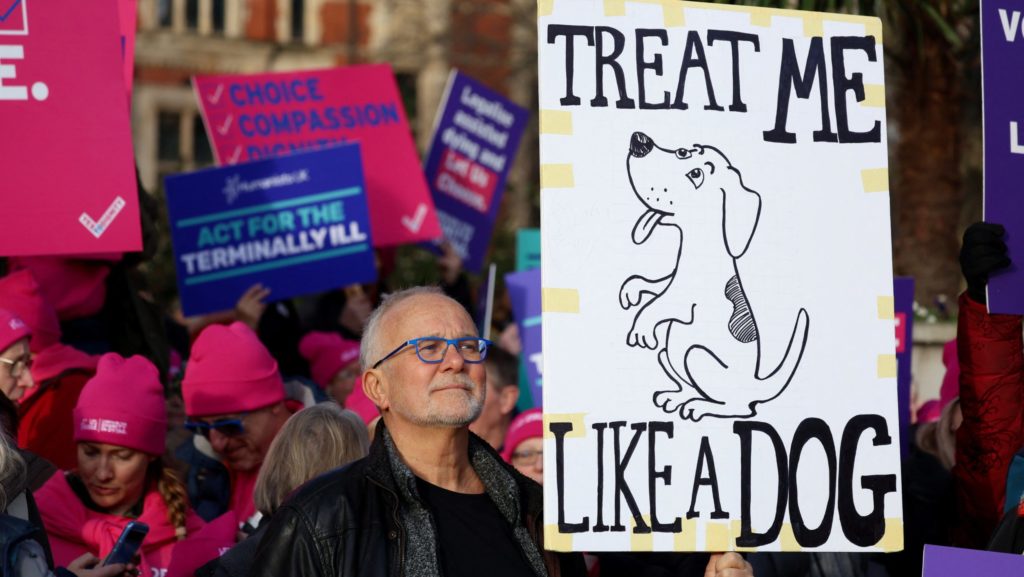Bishops in Ireland are calling on politicians to protect the dignity of every human person as the movement to legalize assisted suicide grows in both the United Kingdom and the Republic of Ireland.
“Assisted suicide, far from being an expression of autonomy, is a failure of care. By legislating for assisted suicide or euthanasia, the State would contribute to undermining the confidence of people who are terminally ill, who want to be cared for and want to live life as fully as possible until death naturally comes,” the bishops said after their Winter 2024 General Meeting.
Last week, Labour MP Kim Leadbeater’s Terminally Ill Adults (End of Life) Bill was approved by the UK Parliament by a vote of 330 in favor to 275 against, an important step in legalizing assisted suicide. The Irish parliament recently accepted the Report of the Joint Oireachtas Committee on Assisted Dying, which advocated legalizing assisted suicide.
“In our culture, we rightly hold doctors and nurses in high esteem because they are presumed always to be at the service of life, for as long as their patient lives. We call on Catholics to stand firmly in support of nurses and doctors who stand for life. One day it may be your life,” the Irish bishops said after their meeting.
Recently, Ireland held new national elections, and the bishops appealed to the new government to uphold human life at all its stages, “and to prioritize the provision of palliative care for people living with chronic and terminal illness.”
In October, the Irish parliament – called the Dáil – voted to “note” the final report of the Joint Oireachtas Committee on Assisted Dying, which calls on the Republic of Ireland to legalize assisted dying in certain restricted circumstances.
Eilís Mulroy of the Pro Life Campaign said in a statement that it is important to recognize the vote was not a vote on the issue of euthanasia or assisted suicide itself “but was on whether to note the radical and far-reaching report of the Joint Committee on Assisted Dying, which called for the introduction of euthanasia/assisted suicide.”
“It would have been preferable if a majority of TDs had voted No. It is clear from the remarks of many Oireachtas members in recent days that they haven’t reflected on or studied the extreme recommendations contained in the JCAD report,” she said.
“In addition to reducing the value of human life and undermining anti-suicide campaigns, the introduction of euthanasia/assisted suicide in Ireland would have the impact of undercutting investment in palliative care and would inevitably lead to certain vulnerable groups feeling growing pressure to opt for euthanasia/assisted suicide, as shown by what has happened in the small number of countries that have gone down this road,” Mulroy continued.
“Significantly the push for euthanasia/ assisted suicide has been opposed by professional bodies such as the College of Psychiatrists of Ireland and the Irish Palliative Medicine Consultants Association. I sincerely hope TDs will take account of this going forward,” she said.
“The focus of the Oireachtas should be on promoting assisted living, not assisted dying. There is so much good and life-affirming work that needs to be done in this area and candidates in the upcoming General Election have a duty to state clearly where they stand on the issue, so voters are left in no doubt with regard to their position,” Mulroy added.
The Irish bishops have also called for more focus on palliative care.
“It is our experience however that, in the final weeks of terminal illness, many people can be helped to experience human and spiritual growth,” they said in a statement earlier this year.
“Faced with the reality of their own mortality, they can and do come to understand themselves better, and to experience the love of family members and friends. This can be a time when old hurts are healed and people find inner peace. This process is supported through palliative and pastoral care, which places the focus on the needs of the whole person,” the bishops’ statement said.
“The Church does not and never has insisted on the use of extraordinary means to prolong life. Nor is there any moral obligation on a sick person to accept treatment which they feel is unduly burdensome,” the bishops added.
“A decision to end life prematurely, however, cuts off any prospect of growth or healing and represents a failure of hope. It is surely far better when a person’s freedom to live is affirmed and supported by a compassionate community of care,” they said.

